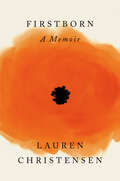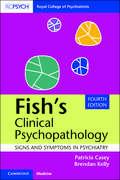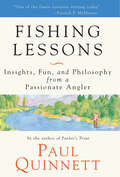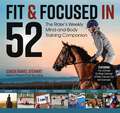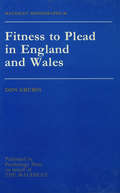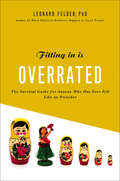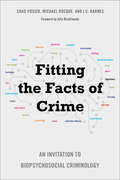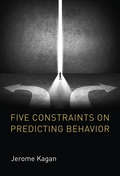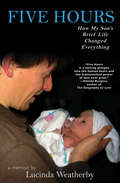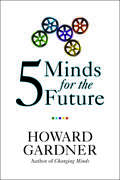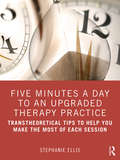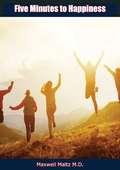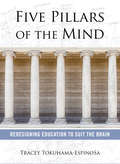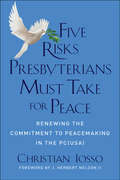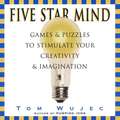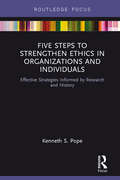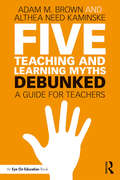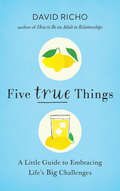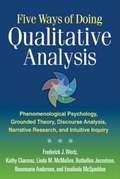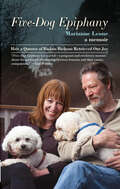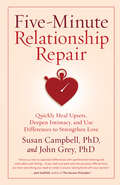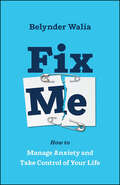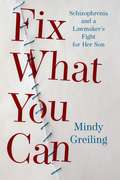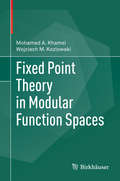- Table View
- List View
First-Time Landlord: Your Guide to Renting out a Single-Family Home
by Janet Portman Marcia Stewart Ilona BrayWhether you're ready for a new entrepreneurial opportunity or considering renting out a home instead of selling, you'll need to learn the basics of being a landlord. Let First-Time Landlord show you how to start your landlording business and maintain it in your spare time. Get the concise information you need to start making money with a single-family home, written for property owners with little business savvy -- and even less time and patience. Learn how to rent out your property lawfully and safely with valuable information on: how to determine whether the property will turn a profit landlord business basics finding the right tenants preparing and signing the lease handling repairs complying with your state's rental laws dealing with problem tenants, and preparing for sale of the property. From timely tips to true stories from successful landlords, First-Time Landlord is an indispensable book for property owners who want to rent out a single-family home without the hassle -- quickly, efficiently and legally.
Firstborn: A Memoir
by Lauren ChristensenA lapidary memoir of losing a child before she can be born, which the author began writing the day she came home from the hospital—an intimate story about our most searing losses and brightest hopes&“Some days I still think this is all just a sad story I&’ll tell Simone one day.&”Lauren Christensen is a thirtysomething editor in New York City when she meets her future husband, Gabe, a writer with whom she falls in love right away. Her beloved grandfather is dying, but the young couple is bringing new life into the family: Lauren and Gabe joyfully discover she is pregnant with their daughter, Simone.As Lauren faces the prospect of becoming a parent, she learns to let go of the fear of abandonment and need for control instilled in her by growing up with a largely absent father and a high-powered mother who was often away on business. Lauren and Gabe are incandescently happy in their exuberant, messy, beautiful shared world. But just weeks after their wedding, they learn that their worst nightmare has come true: Simone is dying in the womb.In fierce, tender, spellbinding prose, Firstborn brings us to the very heart of the human paradox: How do we live when everyone who makes up our world will someday be gone? And how can we mourn when the cosmic order has been turned upside down—when a child dies before she is born?As she comes up against the brutal limits of maternal healthcare and the limitlessness of her love for her daughter, Lauren Christensen finds a key, generous and brave, in which to share her loss, a testimony whose diamond-like brilliance refracts a universal light.
Fish's Clinical Psychopathology: Signs and Symptoms in Psychiatry
by Brendan Kelly Patricia CaseyPsychopathology lies at the centre of effective psychiatric practice and mental health care, and Fish's Clinical Psychopathology has shaped the training and clinical practice of psychiatrists for over fifty years. The fourth edition of this modern classic presents the clinical descriptions and psychopathological insights of Fish's to a new generation of students and practitioners. It includes recent revisions of diagnostic classification systems, as well as new chapters that consider the controversies of classifying psychiatric disorder and the fundamental role and uses of psychopathology. Clear and readable, it provides concise descriptions of the signs and symptoms of mental illness and astute accounts of the varied manifestations of disordered psychological function, and is designed for use in clinical practice. An essential text for students of medicine, trainees in psychiatry and practising psychiatrists, it will also be useful to psychiatric nurses, mental health social workers and clinical psychologists.
Fishing Lessons: Insights, Fun, and Philosophy from a Passionate Angler
by Paul QuinnettWith honesty, wit and erudition, the acclaimed author of Pavlov’s Trout delves into the philosophical lessons learned from a lifetime of fishing.Despite its title, Fishing Lessons will not show readers how to fish. In fact, you don't even have to like to fish to enjoy and appreciate the latest book from renowned psychologist, fisherman, and essayist Paul Quinnett. Fishing Lessons is a rich mix of anecdotes, observations, essays, short stories, one-liners, and personal revelations from Quinnett's rich life and fishing journals. In his straightforward style, Quinnett rounds out the trilogy that began with Pavlov's Trout and Darwin's Bass, the first books ever written on the psychology of fishing. This time he tackles the philosophy of fishing—a philosophy of enjoying life. Over the course of its pages, Fishing Lessons provides satisfying essays that won't so much teach you about fishing as they will teach you about yourself.
Fit & Focused in 52
by Daniel StewartCoach Daniel Stewart has made a name for himself over the past 25 years, enthusiastically training riders of all levels throughout the world, as well as coaching top athletes on several US Equestrian Teams at World Championships, World Equestrian Games, and the Olympics. He's widely considered one of the world's leading experts on equestrian sport psychology, athletics, and performance, providing tips and quips at hundreds of clinics a year, in his bestselling books, and online through his Pressure Proof Academy.Now Coach Stewart is combining his popular rider mental conditioning techniques with ideas for physical conditioning, as well. InFit & Focused in 52, readers get quick-hit recommendations for one exercise for the body, and one for the mind, for every week of the year. The end goal is attaining full-on fitness that ensures improved performance on horseback, whatever your age, ability, or discipline. With 52 weeks of creative cross-training, and loads of ideas for customizing workouts to fit personal goals and lifestyle schedules, riders are sure to find themselves positive, pumped up, and ready to go, from head to toe.
Fitness To Plead In England And Wales (Maudsley Series)
by Donald GrubinThe concept of fitness to plead has its origins in the medieval courts of England, where the ritual of court proceedings demanded that accused individuals respond to the charges against them. Being fit to plead, however, has involved into a fundamental principle of British law and those legal systems that have evolved from it, and it is now associated with the principle of a fair trial. But in spite of its long heritage, the meaning of "being fit to plead", its implications and its consequences all remain vague. Little research has taken place in relation to the concept or its applications in England and Wales, and much of what has been said about fitness to plead has taken place in a factual vacuum.; This book is the result of extensive research into both the development of the concept of fitness to plead and its application. It is based on a review of all individuals found unfit in England and Wales between 1976 and 1988 and provides detailed information about those found unfit to plead and the circumstances associated with their findings, together with follow-up of the psychiatric and legal outcomes. Problems with the working of the law in relation to fitness to plead are discussed and recent changes to it are critically reviewed. The end result is a full consideration of whether the modern concept of fitness to plead protects individuals from unfair trials, and the courts from miscarriages of justice.
Fitting In Is Overrated: The Survival Guide for Anyone Who Has Ever Felt Like an Outsider
by Leonard FelderFrom a psychologist, “practical but insightful coping strategies . . . to build self-awareness and empowerment” around self-acceptance in social situations. (Publishers Weekly)To thine own self be true. But can you do that while still being a valued part of the wider community? Or must you always sacrifice your own inclinations and desires to fit in? For anyone who has ever felt like an outsider at work, in groups, in school, or even in your own extended family, help is on the way. Bestselling author Leonard Felder, PhD, has written the first book with advice on how to be successful personally and professionally when you think differently, live differently, create differently, or solve problems differently than those around you. This wise and perceptive guide is neither about withdrawing into isolation and passivity, nor about spending every waking hour battling with others. Rather, it’s about choosing wisely when to speak your truth and saying it in a way that gets positive results. Dr. Felder shows exactly how creative, thoughtful, unique individuals can survive and thrive in social situations. He provides actual examples from his own practice and precise techniques that will assure your good ideas, outsider perspective, and innovative solutions are respected and taken seriously. Both inspiring and practical, it offers soothing balm and useful answers for everyone who heard too often during adolescence or young adulthood that “you just don’t fit in”—and for the ones who love and counsel them, too. Even more important, it reveals how the very qualities that made you different can become your greatest strengths and most important gifts to the world.
Fitting the Facts of Crime: An Invitation to Biopsychosocial Criminology
by Chad Posick Michael Rocque J.C. BarnesBiosocial criminology—and biosocial criminologists—focuses on both the environmental and biological factors that contribute to antisocial behavior. Importantly, these two domains are not separate parts of an equation but pieces of the same puzzle that fit together for a complete picture of the causes of crime/antisocial behavior. Fitting the Facts of Crime applies a biopsychosocial lens to the “13 facts of crime” identified by John Braithwaite in his classic book, Crime, Shame and Reintegration. The authors unpack established facts—about gender and sex, age, environment, education, class, social bonds and associations, stress, and other influences—providing both empirical research and evidence from biopsychosocial criminology to address the etiology behind these facts and exactly how they are related to deviant behavior. With their approach, the authors show how biopsychosocial criminology can be a unifying framework to enrich our understanding of the most robust and well-established topics in the field. In so doing, they demonstrate how biological and psychological findings can be responsibly combined with social theories to lend new insight into existing inquiries and solutions. Designed to become a standard text for criminology in general, Fitting the Facts of Crime introduces key concepts and applies them to real-world situations.
Five Constraints on Predicting Behavior
by Jerome KaganA distinguished psychologist considers five conditions that constrain inferences about the relation between brain activity and psychological processes. Scientists were unable to study the relation of brain to mind until the invention of technologies that measured the brain activity accompanying psychological processes. Yet even with these new tools, conclusions are tentative or simply wrong. In this book, the distinguished psychologist Jerome Kagan describes five conditions that place serious constraints on the ability to predict mental or behavioral outcomes based on brain data: the setting in which evidence is gathered, the expectations of the subject, the source of the evidence that supports the conclusion, the absence of studies that examine patterns of causes with patterns of measures, and the habit of borrowing terms from psychology. Kagan describes the important of context, and how the experimental setting—including the room, the procedure, and the species, age, and sex of both subject and examiner—can influence the conclusions. He explains how subject expectations affect all brain measures; considers why brain and psychological data often yield different conclusions; argues for relations between patterns of causes and outcomes rather than correlating single variables; and criticizes the borrowing of psychological terms to describe brain evidence. Brain sites cannot be in a state of “fear.” A deeper understanding of the brain's contributions to behavior, Kagan argues, requires investigators to acknowledge these five constraints in the design or interpretation of an experiment.
Five Hours: How My Son's Brief Life Changed Everything: A Memoir
by Lucinda Weatherby"Heartbreaking and yet uplifting, this is a beautifully written memoir that speaks to the challenges many women face regarding sexuality and motherhood."--Wendy Kline, author of Bodies of Knowledge: Sexuality, Reproduction, and Women's Health in the Second Wave"Powerful and enlightening...I saw what a gift it was for Lucinda Weatherby to carry, deliver, and finally meet her precious child, no matter how briefly. It was a profound paradigm shift for me."--Pamela Colloff, Texas Monthly"Illuminated with courage and humor, Lucinda Weatherby's memoir explores what for any of us would be an unthinkable loss. Wake up to death, and to life, Weatherby writes of her struggle to find her way, to open to the unknown, to grace. Unflinching work--frank, grave, lucid...Five Hours is a moving glimpse into the human heart and the transcendent power of love over grief."--Glenda Burgess, author of The Geography of Love"As Lucinda Weatherby herself says in her memoir, she is an ordinary woman who has opened herself to the mystery of birth and death. She has embraced both exuberance and sorrow--and it shows in these pages. With all the intimate honesty one might find in a diary, she allows us to see that she is not to be pitied, that she in fact sometimes feels herself to be the luckiest mother alive for having known five perfect hours with her son."--Monica Wesolowska, author of Holding Silvan: A Brief LifeCan the death of a newborn be anything other than a tragedy? Lucinda Weatherby's son Theo was born with trisomy 13, a rare chromosomal disorder with fatal birth defects. Rather than take extraordinary steps to prolong what would have been a short and painful life, Lucinda and her husband made the decision to let Theo go. In this brave and beautiful memoir, Lucinda tells the story of Theo's life--a life that was bathed in the love of the family members and close friends who gathered in the predawn hours to welcome him and then say goodbye--and the profound sense of grace his existence bestowed upon all of those he touched. Five Hours is also the story of a mother who is forced to confront every parent's most terrifying fear: losing a child. With unflinching honesty and eloquence and even humor, Lucinda chronicles Theo's life and death, and the inspiring aftermath of an experience most people think they wouldn't be able to survive. All readers, whether parents or not, will be moved by her ability to confront a tragedy and transform it into something healing and transcendent.
Five Minds for the Future
by Howard GardnerWe live in a time of relentless change. The only thing that?s certain is that new challenges and opportunities will emerge that are virtually unimaginable today. How can we know which skills will be required to succeed?In Five Minds for the Future, bestselling author Howard Gardner shows how we will each need to master "five minds" that the fast-paced future will demand:· The disciplined mind, to learn at least one profession, as well as the major thinking (science, math, history, etc.) behind it· The synthesizing mind, to organize the massive amounts of information and communicate effectively to others· The creating mind, to revel in unasked questions - and uncover new phenomena and insightful apt answers· The respectful mind, to appreciate the differences between human beings - and understand and work with all persons· The ethical mind, to fulfill one's responsibilities as both a worker and a citizenWithout these "minds," we risk being overwhelmed by information, unable to succeed in the workplace, and incapable of the judgment needed to thrive both personally and professionally.Complete with a substantial new introduction, Five Minds for the Future provides valuable tools for those looking ahead to the next generation of leaders - and for all of us striving to excel in a complex world.Howard Gardner-cited by Foreign Policy magazine as one of the one hundred most influential public intellectuals in the world, and a MacArthur Fellowship recipient-is the Hobbs Professor of Cognition and Education at the Harvard Graduate School of Education.
Five Minutes a Day to an Upgraded Therapy Practice: Transtheoretical Tips to Help You Make the Most of Each Session
by Stephanie EllisFive Minutes a Day to an Upgraded Therapy Practice is a compilation of short, useful suggestions based on classic theory, current research, and wisdom gathered over fifteen years of clinical practice, supervision, and graduate teaching in psychology and counseling. Chapters include highly practical upgrades on standard therapy techniques and ideas for continual therapist development (that respect the busy life of the mental health professional!). The book is made up of ten sections, each with ten short chapters, each readable in under five minutes. It is an indispensable resource for practicing mental health clinicians, including counselors, clinical social workers, psychologists, and other helpers, as well as advanced students in counseling or similar graduate programs.
Five Minutes to Happiness
by Maxwell MaltzFIVE MINUTES TO HAPPINESS CAN MEAN A LIFETIME OF JOY!“We are here in this world to succeed as human beings, not fail, and we can succeed and be happy if we care to learn a little about ourselves. All we need is five minutes a day to understand ourselves. Five minutes to happiness! It is the greatest adventure in our life. It’s up to us.”This is from the introduction to a book that can constructively change your entire life and life pattern, be you fourteen, forty, or eighty! Dr. Maxwell Maltz, whose book PSYCHO-CYBERNETICS was a sensational bestseller, has applied his years of study and research into character change and development to help you. In simple steps and clear language, Dr. Maltz tells you about the happiness habit, and helps you develop it for yourself.FIVE MINUTES TO HAPPINESS works! Take those few minutes each day and watch you and your life become better, more rewarding—and happier!
Five Pillars of the Mind: Redesigning Education To Suit The Brain
by Tracey Tokuhama-EspinosaFrom the author of Neuromyths, a revolutionary look at teaching and learning via the logical pathways of the brain. A review of the research on brain networks reveals, surprisingly, that there are just five basic pillars through which all learning takes place: Symbols, Patterns, Order, Categories, and Relationships. Dr. Tokuhama-Espinosa proposes that redesigning school curriculum around these five pillars—whether to augment or replace traditional subject categories—could enable students to develop the transdisciplinary problem-solving skills that are often touted as the ultimate goal of education. Heralding a potential paradigm shift in education, Five Pillars of the Mind explores how aligning instruction with the brain's natural design might just be the key to improving students' learning outcomes.
Five Risks Presbyterians Must Take for Peace: Renewing The Commitment To Peacemaking In The Pc(usa)
by Christian IossoBelieving peacemaking to be an inherent part of discipleship, Presbyterians have taken many valiant stands for peace throughout our history. However, changing global realities, political and military actions, and new weapons of war have made the world less safe than ever. The church must reconsider how to be faithful peacemakers in this changing reality. <P><P>The Presbyterian Church recently spent six years reflecting on peacemaking. Building on past policy documents, people at all levels of the church studied and discussed what peacemaking policies needed to be modified given the world context today. The 2016 PC(USA) General Assembly affirmed five affirmations the church must make to fulfill its peacemaking calling. Those affirmations become risks when truly taken, because their message collides with the demands for continued sacrifice by the powers that be. In this timely resource, author Christian Iosso explains what the five risks are, how they differ from previous positions, and what taking each risk might look like today. <P><P>Ideal for individual or group study, this important resource includes questions for reflection and discussion.
Five Star Mind: Games and Exercises to Stimulate your Creativity and Imagination
by Tom WujecUsing puzzles, tips, thought association, relaxation techniques, games of "What If," and constant questioning, Tom Wujec cajoles you into realizing your inherent power for creative thought and expression. In addition to helping you discover your innate abilities, Wujec shows you innumerable ways to apply your new ideas and creativity to work, to everyday life, or to just having fun. With Five Star Mind, you participate in the creative process, develop your inventiveness and imagination, and enhance skills that will have you cooking up five-star ideas of your own!
Five Steps to Strengthen Ethics in Organizations and Individuals: Effective Strategies Informed by Research and History
by Kenneth S. PopeFive Steps to Strengthen Ethics in Organizations and Individuals draws on research and history to present effective tools to strengthen organizational ethics. Focusing on key topics such as the planning fallacy, moral disengagement, moral courage, the illusion of ethical superiority, confirmation bias, groupthink, whistleblowers, mindfulness and mindlessness, making authentic apologies, and more, this book discusses specific positive actions that get results and avoid common pitfalls. Research findings and examples from organizations—including missteps by the Veterans Administration, Penn State University, the APA, General Motors, Enron, and Wells Fargo—inform the strategies this book presents and highlight lessons in organizational ethics. Scholars, researchers, professionals, administrators, students, and others interested in organizational studies and ethics will find this unique book essential in training and practice.
Five Teaching and Learning Myths—Debunked: A Guide for Teachers
by Adam M. Brown Althea Need KaminskeDrawing from research in developmental and educational psychology, cognitive science, and the learning sciences, Five Teaching and Learning Myths—Debunked addresses some of the most commonly misunderstood educational and cognitive concerns in teaching and learning. Multitasking, problem-solving, attention, testing, and learning styles are all integral to student achievement but, in practice, are often muddled by pervasive myths. In a straightforward, easily digestible format, this book unpacks the evidence for or against each myth, explains the issues concisely and with credible evidence, and provides busy K-12 teachers with actionable strategies for their classrooms and lesson plans.
Five True Things: A Little Guide to Embracing Life's Big Challenges
by David RichoBestselling author David Richo gets straight to the heart of how to find courage and contentment when life doesn’t go according to plan. Rather than fighting against them, we all must accept these five true things: (1) everything changes and ends, (2) things do not always go according to plan, (3) life is not always fair, (4) pain is part of life, and (5) people are not loving and loyal all the time. Drawing on both psychology and spirituality, Richo offers time-tested insights on finding meaning and joy in life as it really is and relationships as they are.Five True Things distills the essential wisdom of Richo’s popular book The Five Things We Cannot Change. By changing our approach to our struggles, we can find deep happiness.
Five Ways of Doing Qualitative Analysis
by Kathy Charmaz Frederick WertzThis unique text provides a broad introduction to qualitative analysis together with concrete demonstrations and comparisons of five major approaches. Leading scholars apply their respective analytic lenses to a narrative account and interview featuring "Teresa," a young opera singer who experienced a career-changing illness. The resulting analyses vividly exemplify what each approach looks like in action. The researchers then probe the similarities and differences among their approaches; their distinctive purposes and strengths; the role, style, and subjectivity of the individual researcher; and the scientific and ethical complexities of conducting qualitative research. Also included are the research participant's responses to each analysis of her experience. A narrative account from another research participant, "Gail," can be used by readers to practice the kinds of analysis explored in the book.
Five-Dog Epiphany: How A Quintet Of Badass Bichons Retrieved Our Joy
by Marianne LeoneA new installment in best-selling author Ann Hood’s Gracie Belle imprint, actress Marianne Leone’s (The Sopranos, etc.) memoir explores how a bereaved couple and a pack of rescue dogs rediscovered joy IN FIVE-DOG EPIPHANY, MARIANNE LEONE writes about the joy that can be summoned after a great loss, "when you look into the eyes of another damaged creature and know that your happiness is a mirror and an echo and a prayer, and that the little soul reflecting all that energy is happy too, at last." This memoir is a moving and sometimes surprisingly funny exploration of grief and the mutual healing that can occur between rescue dogs and people who have experienced a soul-crushing loss. Leone and her husband, actor Chris Cooper, lost their only child suddenly in 2005. Jesse was seventeen, a straight-A student, and a brilliant poet, who was also quadriplegic and nonverbal except with the assistance of a computer. When six-year-old Jesse miraculously blurted "dog" to Santa, Goody appeared on his bed on Christmas morning. Goody was followed by Lucky, Frenchy, Titi, and Sugar, all rescues adopted after Jesse’s passing. After Jesse’s death, Leone grew a tumor the size of her premature son at birth, her husband disappeared into dark acting roles (Breach, Married Life), and Leone fainted during the filming of a scene in The Sopranos where she is standing in front of her television son’s coffin. This is the story of a bereaved couple and a pack of rescue dogs finding their way to a new life, everyone licking their wounds, both corporal and spiritual, and the rediscovery of joy.
Five-Minute Relationship Repair: Quickly Heal Upsets, Deepen Intimacy, and Use Differences to Strengthen Love
by Susan Campbell, PhD, John Grey, PhDThe Tool Kit No Relationship Should Be Without Long-term happiness in love depends on a couple’s ability to repair the inevitable rifts and differences, large and small, that occur in any relationship. Neuroscience suggests that relationship upsets are best mended quickly, or they accumulate in long-term memory, increase reactive communication, and become harder to repair successfully. And good repair takes five minutes or less! This book offers practical tools and suggested scripts for resolving problems and having your needs met. Following its guidance, you can turn difficulties into opportunities to foster love, trust, and thriving intimacy.
Fix Me: How to Manage Anxiety and Take Control of Your Life
by Belynder WaliaSimple and effective techniques for managing and reducing anxiety In Fix Me: How to Manage Anxiety and Take Control of Your Life, celebrated psychotherapist Belynder Walia presents a practical and inspiring exploration of the simple steps you can take right now to effectively reduce anxiety in the short and long term, while embarking on an incredible journey of self-discovery. In the book, you’ll learn leading-edge techniques that empower you to take control of anxiety and find useful tools you can implement immediately to reduce your symptoms and discomfort. Enriched with profound personal narratives and enlightening case histories, Belynder provides relatable experiences which motivate hope. Fix Me offers step-by-step strategies to combat the overwhelming feelings of worthlessness and powerlessness that often accompany anxiety disorders. Following these invaluable guidelines will equip you with the necessary tools to regain control, nurture your self-esteem, and embrace your inner strength. You’ll also find: A structured quiz, combined with quick-fix solutions, at the beginning of the book A unique perspective focusing on the interconnection between the head, heart, and gut and how you can harmonise them to regulate chemical releases and improve your well-being Specific techniques that will help you reduce and manage anxiety without the additional cost and difficulty associated with finding a therapist Perfect for anyone looking for help in managing the symptoms of anxiety but who finds it challenging or impossible to access qualified mental health care, Fix Me is also an essential resource for those who wish to help loved ones who suffer from serious anxiety.
Fix What You Can: Schizophrenia and a Lawmaker's Fight for Her Son
by Mindy GreilingOne mother&’s fight to support her son and change a broken system In his early twenties, Mindy Greiling&’s son, Jim, was diagnosed with schizoaffective disorder after experiencing delusions that demanded he kill his mother. At the time, and for more than a decade after, Greiling was a Minnesota state legislator who struggled, along with her husband, to navigate and improve the state&’s inadequate mental health system. Fix What You Can is an illuminating and frank account of caring for a person with a mental illness, told by a parent and advocate. Greiling describes challenges shared by many families, ranging from the practical (medication compliance, housing, employment) to the heartbreaking—suicide attempts, victimization, and illicit drug use. Greiling confronts the reality that some people with serious mental illness may be dangerous and reminds us that medication works—if taken. The book chronicles her efforts to pass legislation to address problems in the mental health system, including obstacles to parental access to information and insufficient funding for care and research. It also recounts Greiling&’s painful memories of her grandmother, who was confined in an institution for twenty-three years—recollections that strengthen her determination that Jim&’s treatment be more humane. Written with her son&’s cooperation, Fix What You Can offers hard-won perspective, practical advice, and useful resources through a brave and personal story that takes the long view of what success means when coping with mental illness.
Fixed Point Theory in Modular Function Spaces
by Mohamed A. Khamsi Wojciech M. KozlowskiThis monograph provides a concise introduction to the main results and methods of the fixed point theory in modular function spaces. Modular function spaces are natural generalizations of both function and sequence variants of many important spaces like Lebesgue, Orlicz, Musielak-Orlicz, Lorentz, Orlicz-Lorentz, Calderon-Lozanovskii spaces, and others. In most cases, particularly in applications to integral operators, approximation and fixed point results, modular type conditions are much more natural and can be more easily verified than their metric or norm counterparts. There are also important results that can be proved only using the apparatus of modular function spaces. The material is presented in a systematic and rigorous manner that allows readers to grasp the key ideas and to gain a working knowledge of the theory. Despite the fact that the work is largely self-contained, extensive bibliographic references are included, and open problems and further development directions are suggested when applicable. The monograph is targeted mainly at the mathematical research community but it is also accessible to graduate students interested in functional analysis and its applications. It could also serve as a text for an advanced course in fixed point theory of mappings acting in modular function spaces.

